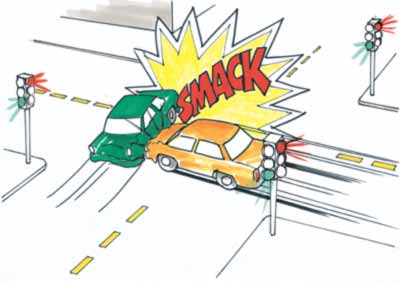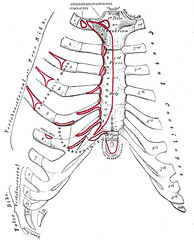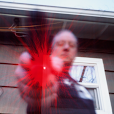I am a sceptic, and I require evidence. Fundamental religious literalism doesn't work for me. Just because it's written down in a several-times translated book? Nope. I have no patience for matters of faith dressed up as science. I accept that the universe is vastly big, and complex, and amazing. It came from somewhere, but I can't assume the arrogance necessary to tell you that I possess that secret.
When I get emails with believe-it-or-not photographs or amazing stories, I do not. I am at
 snopes.com so fast, checking the data, that the keyboard virtually smokes. But show me a compelling body of supporting evidence, and I can change my mind. However, I feel somewhat conflicted that I, this man of logic, this 21st century Vulcan, has a firm belief in luck. I always have and I've always considered myself lucky. Clearly, Luck exists. In fact, I once guessed exactly which of the pictured Flintstones toys was free inside my box of Fruity Pebbles. The lottery winner, the guy in the horrible rollover accident who walks away, the cop saved from a bullet by a badge. Good luck. Hit by a falling tree while hiking, freak accident, random act of violence? Bad luck.
snopes.com so fast, checking the data, that the keyboard virtually smokes. But show me a compelling body of supporting evidence, and I can change my mind. However, I feel somewhat conflicted that I, this man of logic, this 21st century Vulcan, has a firm belief in luck. I always have and I've always considered myself lucky. Clearly, Luck exists. In fact, I once guessed exactly which of the pictured Flintstones toys was free inside my box of Fruity Pebbles. The lottery winner, the guy in the horrible rollover accident who walks away, the cop saved from a bullet by a badge. Good luck. Hit by a falling tree while hiking, freak accident, random act of violence? Bad luck.Lucky guess. Beginner's luck. Lucked out. Luck of the Irish. Lady Luck. Hard luck. Luckless. We are surrounded by luck, like Eskimos with snow, and we have a myriad of ways to describe the phenomenon. Is good luck merely the manifestation of multiple possibilities, some few of which are fantastically favorable? Or are the cards stacked in our favor, by billions of years of stellar, and then millions more of biological evolution? How many stars? How many planets? How precious few with life? What tiny fraction of those host thinking beings, capable of pondering such deep matters? For good or bad, shit happens, and, in the cosmic scheme of things, every last one of us is pretty lucky to be here. It doesn't feel that way when you get a parking ticket, but consider the lifeless, airless ball called Mercury, whizzing so close to our sun that your illegally parked car would melt in a puddle. No luck for you there.
But can you culture luck? Does my heartfelt belief that I am lucky generate more good luck? What about luck charms? What about them? Every culture on Earth claims tokens or symbols that generate luck, for good or ill. Does the mere acceptance of a charm's power to alter my luck actually work? Maybe acknowledging that you have some measure of control over your fate fosters "lucky behaviors". Either way, can you prove or disprove the power of a lucky charm?
We got new bunker gear today. Sexy black stuff, ninja-cool, and state-of-the-art. I moved the miscellaneous tools and gear from old yellow-gold set to the new. In addition to trauma shears, door chocks, my (lucky) leatherman tool, flashlights, pens, hose straps, I have several items that can only be considered talismans. Charms. At some point I imbued them with some lucky quality. I suffer their minuscule weight, flyshit in the pepper given the heavy load I carry upstairs and into a fire, weighing their protective value against the added grams in and on my gear. I have a small spring, pilfered from an engine at the WA State Fire Academy. There is a crenellated binding washer thingy that holds a helmet's face shield in place, normally in conjunction with a locknut. A D-ring from the back of the same helmet. These tiny charms dangle from my bunker pants and tinkle bell-like when I shuffle in my personal protective equipment. They've been with me in every fire, every car wreck, and I'd miss them in their absence. I discovered the inherent power in these trinkets at some point in my fire career, the details of which escape me now, and I still keep my eyes peeled for the watershed event and associated token of my continued good luck. Hanging from my bunker pants I also have gloves and carabiners, but they keep me safe in specific manufacturer-recommended fashion.
 It's not just my turnouts, either. Around my neck, on a silver chain, swings a Saint Florian medal. I really don't believe in saints, I couldn't care if he is the patron saint of Poland; Linz, Austria; and chimney sweeps. All of which, the industrious Florian is, in addition to his duty watching over firefighters. This medal was given to me by my friend J upon my graduation from Fire Academy, and has dangled beneath my collar ever since (barring the two occasions where he apparently wriggled free while I fidgeted in my sleep). From my rear-view mirror hangs a red rabbit's foot. I know, not so lucky for the rabbit, but sometimes luck, I reckon, requires a sacrifice. I picked it up at Lincoln's 10,000 Silver Dollar Bar, in the deceptively named Haugen City, Montana, on the return from a fateful trip to see my Grandma, during which my truck broke down and I needed to find and buy a newer one. In Hawaii, with the lovely LMB, I spent days agonizing over miniature Tiki idols, in tacky junk shops, reading and re-reading the tags describing each particular voodoo, hefting the resin, looking for obvious defects that betrayed a mass-produced pedigree.
It's not just my turnouts, either. Around my neck, on a silver chain, swings a Saint Florian medal. I really don't believe in saints, I couldn't care if he is the patron saint of Poland; Linz, Austria; and chimney sweeps. All of which, the industrious Florian is, in addition to his duty watching over firefighters. This medal was given to me by my friend J upon my graduation from Fire Academy, and has dangled beneath my collar ever since (barring the two occasions where he apparently wriggled free while I fidgeted in my sleep). From my rear-view mirror hangs a red rabbit's foot. I know, not so lucky for the rabbit, but sometimes luck, I reckon, requires a sacrifice. I picked it up at Lincoln's 10,000 Silver Dollar Bar, in the deceptively named Haugen City, Montana, on the return from a fateful trip to see my Grandma, during which my truck broke down and I needed to find and buy a newer one. In Hawaii, with the lovely LMB, I spent days agonizing over miniature Tiki idols, in tacky junk shops, reading and re-reading the tags describing each particular voodoo, hefting the resin, looking for obvious defects that betrayed a mass-produced pedigree. I've never found a four leaf clover, so maybe this is the summer I lie in the grass and pluck at weeds. A four leaf clover looks an awful lot like the Maltese Cross used in the fire service, and adopted from either the Knights of Malta, the firefighters of the Crusades, or St. Florian, depending upon whom you ask. When I find one I'll probably seal it in plastic and attach it to my helmet. Can't hurt.
I've never found a four leaf clover, so maybe this is the summer I lie in the grass and pluck at weeds. A four leaf clover looks an awful lot like the Maltese Cross used in the fire service, and adopted from either the Knights of Malta, the firefighters of the Crusades, or St. Florian, depending upon whom you ask. When I find one I'll probably seal it in plastic and attach it to my helmet. Can't hurt.I try to do lucky things too. Or, at least, avoid implicitly unlucky actions. My department is busy, and gloating over a day with few calls is just asking for a night of ass-kicking. I always announce that the first cup of coffee I drink each morning is the best cup I ever had. It's become a joke, but why tempt fate by changing what works. I used to wear a tiny diamond in my earlobe, removing it for drills or duty when I was a volunteer firefighter. I was actively seeking employment, but also attached to the idea of expressing some aspect of my individuality via my pierced ear. At one point, I removed the stud and promptly misplaced it. For several days I was earring-less and suddenly the phone rang off the hook with requests for interviews, ultimately culminating in an offer from my current department, my first choice all along. You could argue that my hiring experience was the crescendo of much preparation and testing, but I don't wear an earring anymore. I am, after all, a man of science.

















